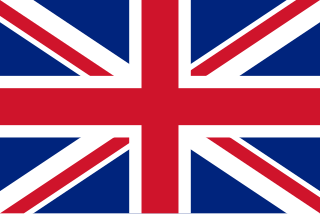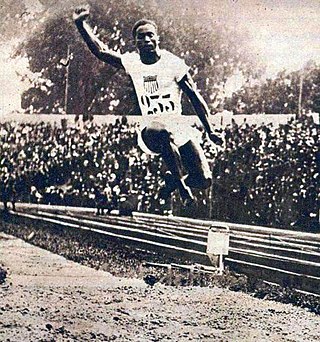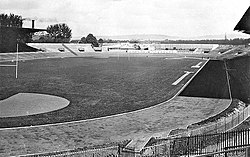
Paavo Ilmari Yrjölä, also known as the Bear of Hämeenkyrö, was a Finnish track and field athlete who won the gold medal in the decathlon at the 1928 Summer Olympics. He also competed in shot put and high jump at the same Games, and in decathlon in 1924 and 1932, but less successfully.

The 1924 Summer Olympics, officially known as the Games of the VIII Olympiad, was an international multi-sport event held in Paris, France, from 4 May to 27 July. A total of 3,089 athletes from 44 nations participated in 126 events in 17 sports across 23 different disciplines.

Athletics has been contested at every Summer Olympics since the birth of the modern Olympic movement at the 1896 Summer Olympics. The athletics program traces its earliest roots to events used in the ancient Greek Olympics. The modern program includes track and field events, road running events, and race walking events. Cross country running was also on the program in earlier editions but it was dropped after the 1924 Summer Olympics.

The men's pole vault was a track & field athletics event at the 1900 Summer Olympics in Paris. It was held on July 15, 1900. Eight athletes from five nations competed in the pole vault.

The modern Olympic Games were founded by French historian Pierre de Coubertin. France has competed in every edition, with the possible exception of the 1904 Games.

France competed at the 1912 Summer Olympics in Stockholm, Sweden. 119 competitors, 118 men and 1 woman, took part in 66 events in 13 sports.

Great Britain, represented by the British Olympic Association (BOA), competed at the 1924 Summer Olympics in Paris, France. This was the first Summer Olympics in which athletes from the newly independent Irish Free State competed separately. Following the Royal and Parliamentary Titles Act 1927, the name changed (officially) to 'United Kingdom of Great Britain and Northern Ireland' but the Olympic team competed as Great Britain from the 1928 games onwards. 267 competitors, 239 men and 28 women, took part in 115 events in 18 sports.

The Russian Empire (Russia) competed at the 1912 Summer Olympics in Stockholm, Sweden. 159 competitors took part in 62 events in 15 sports.

Norway competed at the 1912 Summer Olympics in Stockholm, Sweden. 190 competitors, 188 men and 2 women, took part in 58 events in 14 sports.

Liechtenstein competed at the 1936 Summer Olympics in Berlin, Germany, which took place from 1 to 16 August 1936. It was the first Summer Olympics in which Liechtenstein competed, as the Liechtenstein Olympic Committee had been founded the year prior. Six male competitors took part in five events in three sports. None of them won medals.

The Philippines competed at the 1924 Summer Olympics in Paris, France, from May 4 to July 27, 1924. The nation's participation at these Games marked its debut, and the debut of any Southeast Asian country, at the Summer Olympics. The delegation comprised one athlete, sprinter David Nepomuceno, and two officials, attaché B. Minelle and athletics coach and executive officer Regino Ylanan. Two other athletes, Fortunato Catalon and Juan Taduran, were supposed to join Nepomuceno but did not compete.

The men's high jump, also known as the running high jump to distinguish it from the standing high jump, was a track and field athletics event held as part of the Athletics at the 1912 Summer Olympics programme. It was the fifth appearance of the event, which is one of 12 to have been held at every Summer Olympics. The competition was held on July 7, 1912, and on July 8, 1912. Thirty-seven high jumpers from ten nations competed. NOCs could enter up to 12 athletes. The event was won by Alma Richards of the United States, the nation's fifth consecutive victory in the men's high jump. Germany won its second silver medal in the event, after 1904.

The men's long jump event was part of the track and field athletics programme at the 1924 Summer Olympics. The competition was held on Tuesday, July 8, 1924. 34 long jumpers from 21 nations competed. The maximum number of athletes per nation was 4. The event was won by DeHart Hubbard of the United States, the nation's sixth title in the event. Sverre Hansen won Norway's first long jump medal with the bronze.

The men's high jump event was part of the track and field athletics programme at the 1924 Summer Olympics. The competition was held from Sunday, July 6, 1924, and Monday, July 7, 1924. Twenty-seven high jumpers from 17 nations competed. The maximum number of athletes per nation was 4. The event was won by Harold Osborn of the United States, the nation's seventh consecutive victory in the men's high jump. As in 1920, the Americans went 1–2 in the event, with Leroy Brown earning silver. France took its first high jump medal since 1908 with Pierre Lewden's bronze.

The men's pole vault event was part of the track and field athletics programme at the 1924 Summer Olympics. The competition was held on Wednesday, July 9, 1924, on Thursday, July 10, 1924. Twenty pole vaulters from 13 nations competed. The maximum number of athletes per nation was 4. The event was won by Lee Barnes of the United States, the nation's seventh consecutive victory in the men's pole vault. Americans Glen Graham (silver) and James Brooker (bronze) completed the sweep, the second time the United States had done so—though the Americans had taken two golds and a bronze in 1908 and a gold, two silvers, and a bronze in 1912.

Germany competed at the 2012 Summer Olympics in London, from 27 July to 12 August 2012. This was the nation's sixth consecutive appearance at the Summer Olympics after its reunification in 1990. The German Olympic Sports Confederation sent the nation's smallest delegation to the Games since its reunification. A total of 392 athletes, 218 men and 174 women, competed in 23 sports, and were nominated by DOSB on four occasions.

Haiti competed at the 2012 Summer Olympics in London, from 27 July to 12 August 2012. This was the nation's fifteenth appearance at the Olympics, since its national debut at the 1900 Summer Olympics in Paris. Comité Olympique Haïtien selected a team of five athletes, 3 men and 2 women, to compete only in athletics and judo.

Oman competed at the 2016 Summer Olympics in Rio de Janeiro, Brazil, when the event was held from 5 to 21 August 2016. This was the nation's ninth consecutive appearance at the Summer Olympics. Four Omani athletes, two men and two women, were selected to compete in athletics and shooting at the Games. Among them were sprinter Barakat Al-Harthi, the lone returning Olympian from the previous Games.

Haiti competed at the 2016 Summer Olympics in Rio de Janeiro, Brazil, from 5 to 21 August 2016. It was the nation's sixteenth appearance at the Summer Olympics since its debut in 1900.

India competed at the 2020 Summer Olympics in Tokyo, Japan. Originally scheduled to take place from 24 July to 9 August 2020, the games were postponed to 23 July to 8 August 2021, due to the COVID-19 pandemic. India made its official debut at the 1900 Summer Olympics in Paris and has appeared in every edition of the Summer Olympics since 1920. The Games marked the nation's 25th appearance at the Summer Olympics.





















